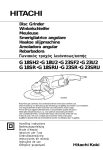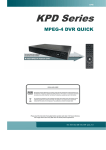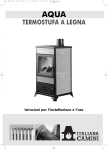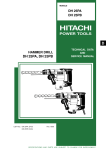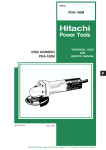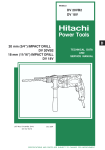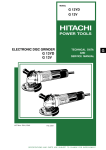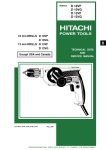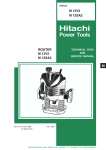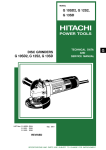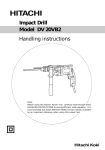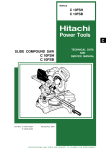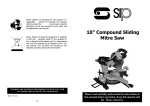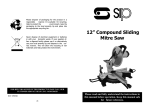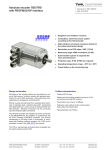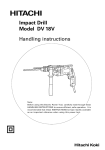Download SP 18VA - Tool Parts Direct
Transcript
MODEL SP 18VA POWER TOOLS ELECTRONIC SANDER POLISHER SP 18VA TECHNICAL DATA AND SERVICE MANUAL S LIST No. 0352 Jun. 2002 SPECIFICATIONS AND PARTS ARE SUBJECT TO CHANGE FOR IMPROVEMENT REMARK: Throughout this TECHNICAL DATA AND SERVICE MANUAL, a symbol(s) is(are) used in the place of company name(s) and model name(s) of our competitor(s). The symbol(s) utilized here is(are) as follows: Competitor Symbol Utilized C Company Name Model Name MAKITA 9227C/9227CB CONTENTS Page 1. PRODUCT NAME ........................................................................................................................... 1 2. MARKETING OBJECTIVE ............................................................................................................. 1 3. APPLICATIONS .............................................................................................................................. 1 4. SELLING POINTS .......................................................................................................................... 1 4-1. Selling Point Descriptions ............................................................................................................... 2 5. SPECIFICATIONS .......................................................................................................................... 3 6. COMPARISONS WITH SIMILAR PRODUCTS .............................................................................. 4 6-1. Specification Comparisons ............................................................................................................. 4 6-2. Practical Test Data .......................................................................................................................... 5 7. PRECAUTIONS IN SALES PROMOTION ..................................................................................... 6 7-1. Handling Instructions ...................................................................................................................... 6 7-2. Caution on Name Plate ................................................................................................................... 6 7-3. Precautions on Usage .................................................................................................................... 6 8. FUNCTION AND OPERATION OF THE CONTROL CIRCUIT ...................................................... 7 8-1. Control Circuit (Block Diagram) ...................................................................................................... 7 8-2. Function of Each Block ................................................................................................................... 7 8-3. Motor Characteristics and Voltage Applied to the Motor ................................................................. 8 9. PRECAUTIONS IN DISASSEMBLY AND REASSEMBLY ............................................................ 9 9-1. Disassembly of the Armature Ass'y ................................................................................................. 9 9-2. Disassembly of the Stator Ass'y .................................................................................................... 10 9-3. Disassembly of the Gear .............................................................................................................. 10 9-4. Reassembly ................................................................................................................................... 11 9-5. Tightening Torque .......................................................................................................................... 11 9-6. Wiring Diagram .............................................................................................................................. 11 9-7. Insulation Tests ............................................................................................................................. 12 9-8. Gear Backlash Value ................................................................................................................... 12 9-9. No-Load Current Value ................................................................................................................. 12 10. STANDARD REPAIR TIME (UNIT) SCHEDULES ..................................................................... 13 Assembly Diagram for SP 18VA 1. PRODUCT NAME Hitachi Electronic Sander Polisher, Model SP 18VA [180 mm (7")] 2. MARKETING OBJECTIVE The Model SP 18VA has been developed to upgrade and replace the current Model SP 18V. The main improvements are increased motor power, weight reduction and improved operability. 3. APPLICATIONS Sanding metallic surfaces. Preparatory sanding and removing rust from metallic surfaces prior to painting, and removing paint prior to repainting. Finishing woodwork and making flush joints of wooden plates. Preparatory sanding wooden surfaces prior to painting. Finishing and polishing painted metallic surfaces of motor vehicles, rolling stocks, elevators, refrigerators, sewing machines, washing machines, medical instruments, and so on. Polishing lacquered surfaces on wooden products such as furniture. Polishing synthetic resin and ebonite products. 4. SELLING POINTS High-power motor, max. output 2,200 W (2.9 HP) Maker C's model: 1,900 W (2.5 HP) Loop handle Variable trigger switch Equipped with electronic control devices Constant speed control Soft start speed control Variable speed control Lightweight: 2.8 kg (6.2 lbs.) Maker C's model: 3.0 kg (6.6 lbs.) Iron bearing bushing improves heat resistance of the bearing chamber on the commutator side. Compact body: 415 mm (10-19/36") Maker C's model: 423 mm (10-3/4") --- 1 --- 4-1. Selling Point Descriptions 1) High-power motor and light weight The Model SP 18VA is equipped with high-power motor and is more powerful than the current Model SP 18V although it is compact and lightweight. We could say that the ratio of the motor's maximum output to the product's weight defines its performance. Compared with a typical competitor's model in terms of this indicator, the Model SP 18VA proves to have the highest performance. Table 1 Comparison of max. output and product weight Maker Model Item Hitachi SP 18VA C SP 18V Max output *1 (W) 2,560 (3.4 HP) 1,700 (2.3 HP) 1,900 (2.5 HP) Actual product weight *2 (kg) 2.8 (6.2 lbs.) 3.0 (6.6 lbs.) 3.0 (6.6 lbs.) 914 (0.55 HP/lbs.) 567 (0.35 HP/lbs.) 633 (0.38 HP/lbs.) Max output/product weight *1 *2 (W/kg) Max. output may vary depending on the market. Actual product weight is a measured weight and excludes cord, loop handle, rubber pad and washer nut. 2) Iron bearing bushing An iron bearing bushing is newly added to the housing. The heat resistance of the bearing chamber on the commutator side is significantly improved in comparison with current models. New ball bearing chamber of housing (SP 18VA) Current ball bearing chamber of housing (SP 18V) Rubber ring Ball bearing Ball bearing Bearing bushing (iron) Ball bearing chamber of housing Ball bearing chamber of housing Fig. 2 --- 2 --- 5. SPECIFICATIONS Model SP 18VA Item Capacity disc dia. 180 mm (7") Power source AC single phase 50 or 60 Hz Voltage (V) Current (A) Voltage, current and input 110 12.0 120 11.0 220 6.0 230 5.7 240 5.5 Input (W) 1,250 Rotation speed (no-load) 0 to 600/3,400 /min Type of motor AC single-phase commutator motor Type of switch Trigger switch Material: Housing Glassfiber reinforced polyamide resin (green) Handle Glassfiber reinforced polyamide resin (black) Gear cover Aluminum alloy die casting Packing gland Coating: Gear cover Metallic silver Packing gland • • • • • • • • • • Enclosure ••••• • • • • • Net* 2.8 kg (6.2 lbs.) Gross 5.5 kg (12.2 lbs.) Weight Packaging Corrugated cardboard box Standard accessories Rubber pad Loop handle Wrench •••••• • • • • • • • • • • • • • • • • • • • • • • • • • • • • • • • • • • • • • • • • • • • • • • • • • • • • • • • • • • • • • • • • • • • • • • • • • • • • • • • • • • • • • • • • • • • • • • • ••••• • • • • • • • • • • • • • • • • • • • • • • • • • • • • • • • • • • • • • • • • • • • • • • • • • • • • • • • • • • • • • • • • • • • • • • • • • • • • • • • • • • • • • • • • • • • • • • • • •••••••••••• • • • • • • • • • • • • • • • • • • • • • • • • • • • • • • • • • • • • • • • • • • • • • • • • • • • • • • • • • • • • • • • • • • • • • • • • • • • • • • • • • • • • • • • • • • • • • • • • * Weight excludes cord, loop handle, rubber pad and washer nut. Relationship between dial settings and rotation speeds of the Model SP 18VA 4,000 3,000 2,000 1,000 1 2 3 4 5 Dial --- 3 --- 6 1 1 1 6. COMPARISONS WITH SIMILAR PRODUCTS 6-1. Specification Comparisons Maker HITACHI Model Capacity disc dia. mm C SP 18VA SP 18V 180 (7") 180 (7") 180 (7") 1,100 1,200 Input W 1,250 Output*1 W 680 407 555 Max. output*1 W 2,560 1,700 1,900 /min. 0 --- 600/3,400 1,400 --- 3,400 0 --- 600/3,000 Dial and trigger switch Dial Dial and trigger switch None Equipped None 84 86 83 Spindle lock Equipped Equipped Equipped Handle type Loop handle Side handle Loop handle Rotation speed (no-load) Variable speed control Overload protection control No-load sound pressure level dB/A Weight*2 Dimensions Catalog kg 2.8 (6.2 lbs.) 3.0 (6.6 lbs.) 3.0 (6.6 lbs.) Actual kg 2.8 (6.2 lbs.) 3.0 (6.6 lbs.) 3.0 (6.6 lbs.) H mm 126 (3-7/36") 128 (3-1/4") 134 (3-5/12") h mm 81 (2-1/18") 82 (2-1/12") 88 (2-2/9") L mm 415 (10-19/36") 417 (10-7/12") 423 (10-3/4") *1 Output may vary depending on the market. *2 Weight excludes cord, loop handle, rubber L pad and washer nut. H h --- 4 --- 6-2. Practical Test Data 1) Comparisons in torque vs. rotation speed Rotation speed of spindle (1/min.) 3500 SP 18VA (maximum speed) 3000 SP 18V (maximum speed) 2500 C (maximum speed) 2000 SP 18V (minimum speed) 1500 1000 SP 18VA (minimum speed) 500 C (minimum speed) 0 1 2 3 4 5 Torque (N•m) 2) Sanding performance comparisons Workpiece material: SPCC (mild steel) Sanding disc used: AP #50 Applied pressure: 4 kg Speed: Maximum speed 350 SP 18VA Sanding dust produced (g) 300 250 C 200 150 SP 18V 100 50 0 5 10 --- 5 --- 15 Time (min.) 7. PRECAUTIONS IN SALES PROMOTION In the interest of promoting the safest and most efficient use of the Model SP 18V Electronic Sander Polisher by all of our customers, it is very important that at the time of sale the salesperson carefully ensures that the buyer seriously recognizes the importance of the contents of the Handling Instructions, and fully understands the meaning of the precautions listed on the Caution Plate attached to each tool. 7-1. Handling Instructions Although every effort is made in each step of design, manufacture and inspection to provide protection against safety hazards, the dangers inherent in the use of any electric tool cannot be completely eliminated. Accordingly, general precautions and suggestions for the use of electric power tools, and specific precautions and suggestions for the use of the Electronic Sander Polisher are listed in the Handling Instructions to enhance the safe and efficient use of the tool by the customer. Salespersons must be thoroughly familiar with the contents of the Handling Instructions to be able to offer appropriate guidance to the customer during sales promotion. 7-2. Caution on Name Plate Each tool is provided with a Name Plate which contains the following basic safety precautions in the use of the tool. (1) For Australia, New Zealand and China (2) For U.S.A. and Canada (3) For Switzerland, U.K., Germany, Belgium, France, Netherlands, Austria, Spain, Italy, Finland, Denmark and Norway 7-3. Precautions on Usage Never press the pushing button while the spindle is rotating: If the pushing button is pressed while the spindle is rotating, the spindle will stop immediately. In such a case, there is a danger that the washer nut may be loosened so that the rubber pad and wool bonnet fly off unexpectedly to cause possible serious injury. --- 6 --- 8. FUNCTION AND OPERATION OF THE CONTROL CIRCUIT 8-1. Control Circuit (Block Diagram) Switch Motor AC power source Triac Rotation speed detector Standard voltage circuit F-V converter Phase control circuit Variable resistor Ramp generator Differential amplifier Soft start and constant speed control circuit Load current detecting circuit Load current control circuit 8-2. Function of Each Block (1) Rotation speed detector: Generates a frequency signal proportionate to the actual rotation speed of the motor. A magnetic sensor in the controller monitors changes in the magnetic flux from a magnet, and generates a frequency signal. (2) F-V converter: Converts the frequency signal produced by the rotation speed detector into DC voltage. (3) Standard voltage circuit: Generates a standard voltage which determines the no-load rotation speed of the motor and serves as a reference in maintaining constant rotation speed even when there are fluctuations in the load. (4) Ramp generator: Generates the voltage which determines the acceleration of the motor. The soft start function when the motor is turned on is achieved through a gradual increase of the voltage generated by this circuit. When fully charged, the voltage of the ramp generator becomes equal to the standard voltage (above). (5) Differential amplifier: Compares the voltage from the ramp generator voltages received from the F-V converter (which is proportionate to the actual motor rotation speed), and amplifies the result. This circuit functions as follows to maintain a constant rotation speed: Motor rotation speed decreases (or increases) (or increases) frequency signal decreases output voltage of the F-V converter decreases (or increases) output voltage of the differential amplifier increases (or decreases). --- 7 --- (6) Load current detecting circuit: Detects the load current by means of a low resistance resistor which is in series with the motor and the triac. (7) Load current control circuit: When the detected load is excessive (overload), this circuit sends a command (control signal) to reduce power to the motor. (8) Phase control circuit: Generates the trigger signals necessary to turn the triac on, and delivers them to the gate of the triac. The conductive angle of the triac is determined by the timing of the generated trigger signals. When starting the tool: Controlled by the soft start circuit, the phase control circuit generates trigger signals to gradually increase the conductive angle of the triac. Constant speed operation: When there are variations in the rotation speed, the phase control circuit generates trigger signals to keep the rotation speed as close as possible to the present rotation speed determined by the standard voltage circuit. In short, when the load increases and causes the rotation speed to decrease, the conductive angle of the triac is increases, and the voltage applied to the motor is increased. In this way, the rotation speed is kept as close as possible to the standard rotation speed. 8-3. Motor Characteristics and Voltage Applied to the Motor Conductive angle Rotation speed Rotation speed determined by the standard voltage circuit Rotation speed Phase control voltage waveform (When electronic control not applied) Dial 6 Soft start characteristics when starting the tool Voltage applied to the motor increases gradually Switch ON Dial As the load inceases, the voltage applied to the motor increases. Dial 0 No-load Load --- 8 --- Time 9. PRECAUTIONS IN DISASSEMBLY AND REASSEMBLY The [Bold] numbers in the descriptions below correspond to the item numbers in the Parts List and exploded assembly diagram for the Model SP 18VA. 9-1. Disassembly of the Armature Ass'y (1) Loosen the two Brush Caps [45], and take out the Carbon Brushes [46]. (2) Remove the four Tapping Screws (W/Flange) D5 x 30 [2]. The Armature Ass'y [13] can then be taken out simultaneously with the Gear Cover Ass'y [5], Packing Gland [30] and related parts. (3) Remove the four Seal Lock Screws (W/Sp. Washer) M5 x 14 (Black) [31], and remove the Packing Gland [30], and related parts. (4) After removing the three Seal Lock Screws (W/Sp. Washer) M4 x 10 [1], the Armature Ass'y [13] can be extracted together with the Bearing Cover (B) [12], and related parts. (5) Carefully wrap the Armature Ass'y [13] with a soft, clean rag to protect it from being damaged, and clamp it securely in a vise. Remove the Retaining Ring for D8 Shaft. (6) As illustrated in Fig. 3, the Ball Bearing 6200DDCMPS2L [9] can be removed from the Armature Ass'y [13] by utilizing a J-204 Bearing Puller (special repair tool, Code No. 970982). After the Ball Bearing has been removed, Bearing Cover (B) [12] can be easily taken off. Push J-204 bearing puller (Code No. 970982) Fig. 3 --- 9 --- 9-2. Disassembly of the Stator Ass'y (1) After taking out the Armature Ass'y [13], loosen the four Tapping Screws (W/Flange) D5 x 20 (Black) [51], and the two Tapping Screws (W/Flange) D4 x 20 (Black) [52] and remove Handle (A) [50] and Handle (B) [49]. (2) Disconnect the lead wires of the Stator Ass'y [16] from the Controller Switch [42]. (3) Disconnect the Brush Terminal [17] from the Brush Holders [47] and take out the Bearing Bushing [41]. (4) Finally, loosen the two Hex. Hd. Tapping Screws D5 x 60 [15], and the Stator Ass'y [16] can be taken out of the Housing Ass'y [35]. If the Stator Ass'y [16] cannot be easily taken out of the Housing Ass'y [35], disassembly can be facilitated by heating the Housing Ass'y to a temperature of approximately 60˚C (140˚F) with an appropriate heating device. 9-3. Disassembly of the Gear (1) Loosen the four Seal Lock Screws (W/Sp. Washer) M5 x 14 (Black) [31], and remove the Packing Gland [30] together with the Spindle [27] and the Gear [22] from the Gear Cover Ass'y [5] as a unit. (2) When it is necessary to remove the Gear [22] from the Spindle [27], it is highly recommended that the special repair tools described below be utilized. As illustrated in Fig. 4, support the Push angled surface of the Gear [22] with a J-278 gear puller (Code No. 315635) J-278 Gear Puller (special repair tool, Code No. 315635), rest the J-278 Gear Puller on the J-130 Sleeve (special repair tool, Code No. 970907), and push down on the tip of the Spindle [27] with a hand press to remove the Gear [22]. J-130 sleeve (Code No. 970907) Fig. 4 --- 10 --- 9-4. Reassembly Perform reassembly in the reverse order of disassembly while observing the given precautions and taking care of the following points. (1) After disassembly, thoroughly remove old grease from the inside of the Gear Cover Ass'y [5], and insert 25 g of new grease (Nippeco JF-375, Code No. 930036, is recommended.) prior to reassembly. When inserting grease, apply it to the pinion gear teeth surfaces, and to the needle bearing inside the gear cover. (2) When replacing the ball bearing on the commutator side of the Armature Ass'y [13], be very careful to ensure that the Dust Seal [34] is assembled in the proper direction. The Dust Seal [34] plays an important role in dustproofing of the ball bearing, and must be replaced with a new one if disassembled. (3) Apply Three Bond TB 1406 Screw Locking Agent to the following screws. Three Seal Lock Screws (W/Sp. Washer) M4 x 10 [1] which fix Bearing Cover (B) [12] in place. Three Seal Lock Screws (W/Sp. Washer) M4 x 10 [23] which fix Bearing Cover (A) [24] in place. Four Seal Lock Screws (W/Sp. Washer) M5 x 14 (Black) [31] which fix Packing Gland [30] in place. 9-5. Tightening Torque D4 Tapping Screws (W/Flange) [53], [52], [43] • • • • • • • • • • • • • • • • • • • • • • • 2.0 0.5 N m (20 • 5 kgf cm, 1.5 0.4 ft-lbs.) • • • • • • • • • • • • • • • • • • • • • • • • • • • • • • 2.9 0.5 N m (30 • 5 kgf cm, 2.2 0.4 ft-lbs.) • • • • • • • • • • • • • • • • • • • • • • • • • 1.8 0.4 N m (18 • 4 kgf cm, 1.3 0.3 ft-lbs.) • • • • • • • • • • • • • • • • • • • • • • • • • • • • • • 3.4 0.7 N m (35 7 kgf cm, 2.5 0.5 ft-lbs.) D5 Tapping Screws (W/Flange) [51] [2] • • D5 Hex. Hd. Tapping Screw [15] M4 Seal Lock Screw (W/Sp. Washer) [23], [1] M5 Seal Lock Screw (W/Sp. Washer) [31] • • • 9-6. Wiring Diagram White or blue White or blue Armature Ass'y [13] Cord [56] White or blue Black or brown Stator Ass'y [16] Controller Switch [42] --- 11 --- 9-7. Insulation Tests On completion of disassembly after repair, measure the insulation resistance and conduct the dielectric strength test. Insulation resistance: 10 M or more with DC 500V megohm tester Dielectric strength test: AC 4,400 V for 1 minute, with no abnormalities •••••••••••••• 220 V --- 240 V AC 3,000 V for 1 minute, with no abnormalities •••••••••••••• 110 V --- 120 V 9-8. Gear Backlash Value Gear blacklash should be maintained at a value of 2 mm or less measured at the outer edge of a fresh depressed center wheel. 9-9. No-Load Current Value After no-load operation for 30 minutes, the no-load current value should be as follows. Voltage (V) 110 120 220 230 240 Current (A) max. 6.8 6.8 3.9 3.9 3.9 --- 12 --- 10. STANDARD REPAIR TIME (UNIT) SCHEDULES MODEL Variable Fixed 10 20 30 40 Work Flow SP 18VA Housing Ass'y Stator Ass'y General Assembly Armature Ass'y Gear Cover Ass'y Ball Bearing (6200DD) Ball Bearing (608VV) Dust Seal Felt Packing (B) Needle Bearing Gear Seal Packing Lock Pin Handle (B) Handle (A) Control Switch Cord --- 13 --- Ball Bearing (6202DD) Spindle Felt Packing (A) Packing Gland 50 60 min. LIST NO. 0352 ELECTRIC TOOL PARTS LIST ELECTRONIC SANDER POLISHER Model SP 18VA 2002 • 6 • 20 (E1) 1 502 501 2 503 504 505 3 4 5 506 6 7 8 9 507 10 11 12 13 18 14 15 19 20 16 21 17 34 22 35 36 23 37 38 24 39 25 40 44 41 26 42 43 27 28 48 47 46 29 50 45 30 49 31 55 32 51 54 53 52 33 56 PARTS ITEM NO. 1 SP 18VA CODE NO. DESCRIPTION NO. USED 303-255 SEAL LOCK SCREW (W/SP. WASHER) M4X10 3 2 305-507 TAPPING SCREW (W/FLANGE) D5X30 4 3 306-888 PUSHING BUTTON 1 4 306-889 SPRING 1 5 320-936 GEAR COVER ASS’Y 1 6 315-055 SEAL RING (A) 1 7 315-054 WASHER (A) 1 8 939-540 RETAINING RING FOR D10 SHAFT (10 PCS.) 1 9 620-0DD BALL BEARING 6200DDCMPS2L 1 10 315-053 RUBBER RING (A) 1 11 315-052 FELT PACKING (B) 1 REMARKS INCLUD.3,4,18-21 12 315-051 BEARING COVER (B) 1 * 13 360-576U ARMATURE ASS’Y 110V-120V 1 * 13 360-576E ARMATURE 220V-240V 1 14 315-046 FAN GUIDE 1 15 961-501 HEX. HD. TAPPING SCREW D5X60 2 16 340-526C STATOR ASS’Y 110V 1 INCLUD.17 * INCLUD.9,11,34,38 * 16 340-526D STATOR ASS’Y 120V 1 INCLUD.17 * 16 340-526E STATOR ASS’Y 220V-240V 1 INCLUD.17 17 930-703 BRUSH TERMINAL 2 18 315-049 FELT WASHER 1 19 320-218 O-RING 1 20 315-050 LOCK PIN 1 21 871-397 NEEDLE BEARING (NTN HK1210) 1 22 320-937 GEAR 1 23 987-201 SEAL LOCK SCREW (W/SP. WASHER) M4X10 3 24 937-077 BEARING COVER (A) 1 25 620-2DD BALL BEARING 6202DDCMPS2L 1 26 940-533 FEATHER KEY 3X3X10 1 * 27 320-943 SPINDLE 1 * 27 320-944 SPINDLE 1 28 315-062 FELT PACKING (A) 1 29 315-060 SEAL PACKING 1 30 315-061 PACKING GLAND 1 31 315-636 SEAL LOCK SCREW (W/SP.WASHER)M5X14(BLACK) 4 * 32 953-255 RUBBER PAD (D16 HOLE) 1 * 32 953-247Z RUBBER PAD (D14 HOLE) 1 * 33 953-246Z WASHER NUT M14 1 * 33 953-254P WASHER NUT 5/8”-11UNC 1 34 315-047 DUST SEAL 1 35 320-945 HOUSING ASS’Y 1 36 320-948 SETTING LABEL 1 NAME PLATE 1 38 608-VVM BALL BEARING 608VVC2PS2L 1 39 995-662 RUBBER RING 1 40 318-721 MAGNET 1 * 37 41 320-946 BEARING BUSHING 1 * 42 320-941 CONTROLLER SWITCH 1 * 42 320-940 CONTROLLER SWITCH 1 43 305-095 TAPPING SCREW (W/FLANGE) D4X20 2 HITACHI LABEL 1 44 * ALTERNATIVE PARTS FOR USA,CAN FOR USA,CAN FOR USA,CAN INCLUD.39,41,47,48 FOR GBR (110V),USA,CAN 6 -- 02 PARTS ITEM NO. 45 46 SP 18VA CODE NO. NO. USED DESCRIPTION 945-161 BRUSH CAP 2 999-043 CARBON BRUSH (1 PAIR) 2 47 958-900 BRUSH HOLDER 2 48 938-477 HEX. SOCKET SET SCREW M5X8 2 49 320-939 HANDLE (B) 1 50 320-938 HANDLE (A) 1 51 302-089 TAPPING SCREW (W/FLANGE) D5X20 (BLACK) 4 52 302-086 TAPPING SCREW (W/FLANGE) D4X20 (BLACK) 2 53 984-750 TAPPING SCREW (W/FLANGE) D4X16 2 54 937-631 CORD CLIP 1 REMARKS 55 953-327 CORD ARMOR D8.8 1 * 56 500-234Z CORD 1 (CORD ARMOR D8.8) * 56 500-435Z CORD 1 (CORD ARMOR D8.8) FOR HKG,GBR (230V) * 56 500-439Z CORD 1 (CORD ARMOR D8.8) FOR NZL,AUS * 56 500-396Z CORD 1 (CORD ARMOR D8.8) FOR GBR (110V) * 56 500-247Z CORD 1 (CORD ARMOR D8.8) FOR NOR,SWE,DEN,FIN * 56 500-447Z CORD 1 (CORD ARMOR D8.8) FOR SUI * 56 500-241Z CORD 1 (CORD ARMOR D8.8) FOR USA,CAN 6 -- 02 * ALTERNATIVE PARTS SP 18VA STANDARD ACCESSORIES ITEM NO. 501 CODE NO. 955-857 NO. USED DESCRIPTION HEX. BAR WRENCH 8MM REMARKS 1 502 937-913Z WRENCH 1 503 320-949 LOOP HANDLE 1 504 949-434 BOLT WASHER M10 (10 PCS.) 2 505 949-844 HEX. SOCKET HD. BOLT M10X20 (10 PCS.) 2 * 506 949-103 WOOL BONNET 180MM 1 EXCEPT FOR FRA,SUI,USA,CAN * 507 314-090 SANDING DISCS 180MM C-P50 (10 PCS.) 1 EXCEPT FOR FRA,SUI,USA,CAN OPTIONAL ACCESSORIES ITEM NO. 601 * CODE NO. NO. USED DESCRIPTION 314-084 SANDING DISCS 180MM C-P16 (10 PCS.) 1 602 314-085 SANDING DISCS 180MM C-P20 (10 PCS.) 1 603 314-086 SANDING DISCS 180MM C-P24 (10 PCS.) 1 604 314-088 SANDING DISCS 180MM C-P36 (10 PCS.) 1 605 314-089 SANDING DISCS 180MM C-P40 (10 PCS.) 1 606 314-090 SANDING DISCS 180MM C-P50 (10 PCS.) 1 607 314-091 SANDING DISCS 180MM C-P60 (10 PCS.) 1 REMARKS 608 314-093 SANDING DISCS 180MM C-P100 (10 PCS.) 1 609 949-103 WOOL BONNET 180MM 1 FOR FRA,SUI,USA,CAN 610 994-322 SIDE HANDLE 1 6 -- 02 * ALTERNATIVE PARTS Printed in Japan (020620N)





















